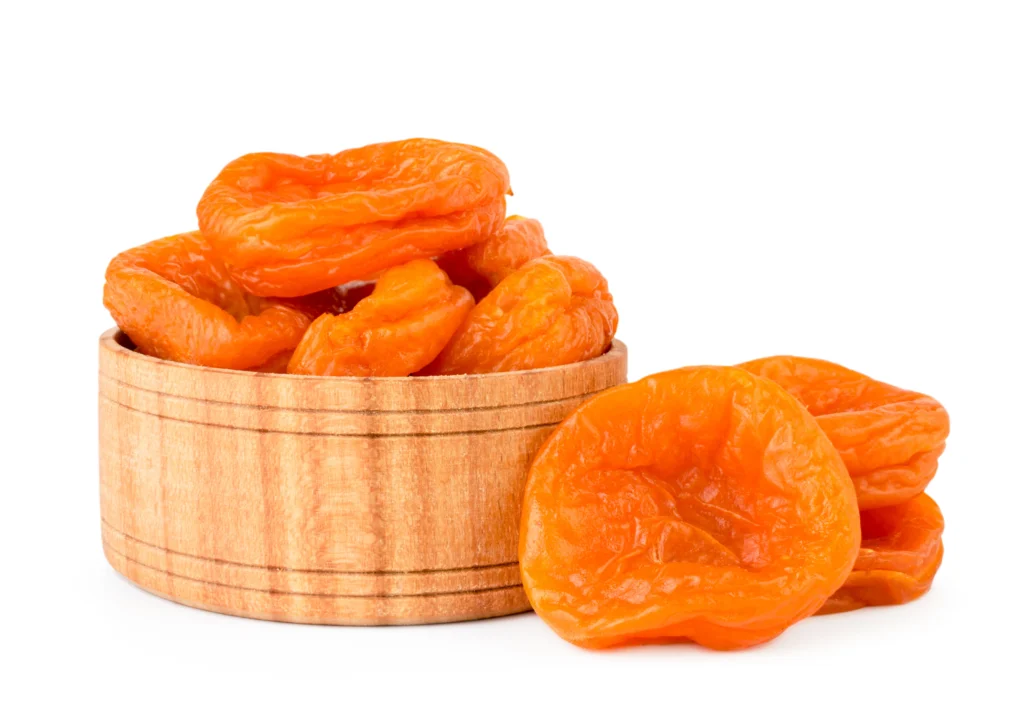Introduction

Dried apricots, commonly known as Khubani, Khoobani, or Khushk Khubani in various parts of the world, are the dried form of the apricot fruit (Prunus armeniaca). They are a popular snack and ingredient in many cuisines, especially in the Middle East, Central Asia, and South Asia. Apricots, when dried, are concentrated in nutrients and offer a range of health benefits. They have a unique sweet-tart flavor, making them not only delicious but also highly nutritious.
Forms of Dried Apricot
Dried apricots come in various forms depending on how they are prepared and processed. The most common forms include:
- Whole Dried Apricots: These are the fully dried apricots, typically soft and wrinkled. Some may have the pit still inside, though most are sold without it.
- Halved Dried Apricots: These are dried apricots that have been cut in half, often with the pit removed. These are commonly sold as a snack or in recipes.
- Sliced Dried Apricots: These are apricots cut into smaller, uniform slices. They are often used for baking, cooking, or as a topping for cereals and salads.
- Unsweetened Dried Apricots: These apricots are dried naturally without the addition of sugar or preservatives, offering a more authentic and wholesome taste.
- Sulfured Dried Apricots: Some dried apricots are treated with sulfur dioxide to retain their bright color and extend shelf life. While these may look more vibrant, they may contain additives that some people prefer to avoid.
- Organic Dried Apricots: These apricots are grown without the use of synthetic fertilizers or pesticides. They are usually available in whole or halved forms.
Health Benefits of Dried Apricot
Dried apricots offer a variety of health benefits, thanks to their rich nutrient profile:

- Rich in Antioxidants: Dried apricots are high in antioxidants, particularly vitamin A and carotenoids, which help fight free radicals and protect the body against oxidative stress. These antioxidants can promote skin health and reduce the risk of chronic diseases.
- Supports Digestive Health: The high fiber content in dried apricots aids digestion by promoting regular bowel movements and preventing constipation. Fiber also helps maintain gut health by promoting the growth of beneficial bacteria.
- Boosts Eye Health: The abundant vitamin A in dried apricots supports good vision and helps prevent age-related macular degeneration and night blindness. Vitamin A is also crucial for maintaining healthy skin and mucous membranes.
- Helps Maintain Healthy Skin: Vitamin C and other antioxidants in dried apricots promote collagen production and protect the skin from the damaging effects of UV rays and pollution, helping maintain a youthful appearance.
- Promotes Heart Health: Dried apricots are rich in potassium, which is essential for regulating blood pressure. A diet rich in potassium can help reduce the risk of hypertension and support heart health. The antioxidants in apricots can also help reduce inflammation and lower the risk of heart disease.
- Supports Bone Health: The high potassium and magnesium content in dried apricots play an important role in maintaining strong bones. Potassium helps regulate calcium balance in the bones, while magnesium supports bone density.
- Improves Iron Levels: Dried apricots contain a significant amount of iron, which helps prevent iron deficiency anemia by promoting the production of red blood cells and improving oxygen circulation in the body.
Side Effects and Considerations
While dried apricots offer numerous health benefits, there are a few considerations to keep in mind:

- High Caloric Content: Dried apricots are energy-dense due to the concentration of sugars and nutrients that occurs during the drying process. Eating large quantities can contribute to excess calorie intake, which could lead to weight gain over time.
- Potential for Digestive Issues: Although fiber is beneficial for digestion, consuming too many dried apricots can lead to bloating, gas, or diarrhea due to their high fiber content. It’s important to consume them in moderation.
- High Sugar Content: Dried apricots contain natural sugars, and while they are a healthier alternative to refined sugar, they should still be consumed in moderation by people with diabetes or those trying to manage blood sugar levels.
- Sulfites Sensitivity: Some dried apricots are treated with sulfur dioxide to preserve their color and freshness. Individuals who are sensitive to sulfites may experience allergic reactions such as headaches, hives, or asthma-like symptoms.
- Kidney Health Considerations: Dried apricots are rich in potassium, which is beneficial for most people but may be problematic for individuals with kidney issues. Excess potassium can accumulate in the bloodstream in people with kidney disease, potentially leading to serious complications.
This Article is for Basic Information. Contact a professional doctor before using it.
HAKEEM KARAMAT ULLAH
+923090560000




